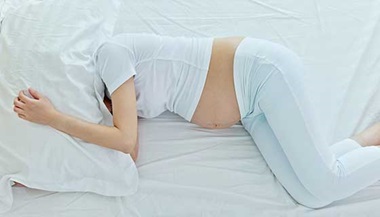Baby Blues and Postpartum Depression: Mood Disorders and Pregnancy
Bringing a baby home can be one of the most joyful times in a woman’s life, but for many, the experience isn’t always so rosy. Lauren Osborne, M.D, former assistant director of the Johns Hopkins Center for Women's Reproductive Mental Health and Lindsay R. Standeven, M.D. explain what women need to know about baby blues, postpartum depression and postpartum psychosis.
The Baby Blues
In fact, most new moms will get the baby blues. These are hormonal changes that can cause anxiety, crying and restlessness that goes away within the first two weeks after giving birth. Also called postpartum blues, the baby blues are actually a mild — and temporary — form of depression that goes away once hormones level out.
Almost every new mother — up to 85 percent of them — will experience the postpartum blues. You may feel happy one minute and overwhelmed and crying the next.
“No mother is happy all the time,” says Osborne. “It’s normal to be frustrated and even need to put the baby down sometimes.”
Postpartum Depression
For others, bad feelings after giving birth become more than a mild case of the blues. As many as one in five new moms have postpartum depression, a more serious, but highly treatable, condition.
Standeven says that both mother and baby can be affected by postpartum depression. “Postpartum depression is the most common complication of pregnancy,” she says. “Untreated depression and anxiety in pregnancy is associated with preterm delivery, higher startle reflex in babies, gestational diabetes and more.”
It can also be life-threatening. Standeven says postpartum depression is a factor in 20% of all maternal deaths, according to data in countries that track the incidence of the problem.
Who Is at Risk for Postpartum Depression?
Postpartum depression symptoms may be more likely ― or more severe ― in some individuals. These are some factors:
History of anxiety or mood disorders. Those with bipolar disorders, depression or anxiety are 30% to 35% more likely to have postpartum depression. Likewise, mothers who have had depression symptoms after previous pregnancies are apt to have them again.
Family history. Those who have family members who have suffered with postpartum mood disorders are more likely to experience them also.
Genetics. Researchers at the Johns Hopkins Women’s Mood Disorders Center identified epigenetic biomarkers — differences in the activity of certain genes — that may predict who’s most likely at risk for postpartum depression.
Postpartum Depression Symptoms
The signs and symptoms of postpartum depression include:
- Anxiety
- Sadness
- Anger and irritability
- Difficulty sleeping
- Intrusive thoughts (which may include thoughts of harming the baby)
If symptoms are severe or last for more than two weeks, a new mom should be concerned about a postpartum mood disorder, such as postpartum depression. Women who had anxiety or depression before giving birth are at higher risk.
“People tend to think of depression as sadness, but that’s not always the case,” Osborne says. “Particularly in the postpartum period, there’s a lot of anxiety and irritability, plus lack of sleep, which is a huge risk factor for postpartum depression.”
And while it’s not necessarily a symptom of depression to be sleeping poorly with a newborn, it can make postpartum depression symptoms worse.
How Long Does Postpartum Depression Last?
Without treatment, postpartum depression symptoms can hang on for months, even years. In one study, 25% of participants were still experiencing depression three years after the birth of their babies. That’s just one more reason why prompt assessment and treatment are recommended.

A Woman's Journey
Empower yourself to make effective health decisions. Attend A Woman's Journey, a conference held throughout the year at locations in Maryland and Florida, where Johns Hopkins physicians discuss the latest health news for women.
Postpartum Psychosis: A Rare Mental Health Emergency
While postpartum depression is relatively common, postpartum psychosis is an extremely rare disorder, affecting just 0.1 percent of new mothers. That number rises to 30 percent in mothers who have bipolar disorder. Symptoms of postpartum psychosis include:
- Confusion and cognitive impairment that may come and go
- Coming in and out of consciousness
- Extremely disorganized behavior
- Hallucinations or delusions
It’s important not to ignore these symptoms, even if you have no history of mood disorder. “Postpartum psychosis can occur in women with no previous history of psychiatric illness,” says Osborne.
She stresses that postpartum psychosis is a psychiatric emergency requiring immediate medical attention because it carries a high rate of suicide and harm to the baby.
The gold-standard treatment for postpartum psychosis includes both lithium (a mood stabilizer) and an antipsychotic medication. With these medications, it is important for a doctor to monitor the baby to ensure that breastfeeding is safe.
Treating Postpartum Mood Disorders
The most important things to know about postpartum mood disorders are that they are highly treatable and not something a new mother needs to feel ashamed about. Even in the most severe cases of postpartum psychosis, one recent study showed that 98 percent of patients got better with treatment.
Treatment for postpartum depression includes antidepressant medications, which have good evidence of safety in breast-feeding.
Women Respond to Medications Differently
Standeven notes that a body of scientific literature on the treatment of women shows they respond differently to medication than do male animals (and humans), who have historically comprised most drug study subjects.
In addition, she says, when it comes to medicating mental health conditions such as depression, pregnancy, perimenopause and other hormonal changes can make some treatment and dosages less effective.
Hormone fluctuations can change how the body responds to medications, including the rate of the kidneys’ filtering of drugs. Estrogen can affect the action of some mood stabilizers. “More research on pregnancy’s impact on pharmacokinetics can help practitioners prescribe medications more effectively,” Standeven says.
Brexanolone for Postpartum Depression
The first medication solely for the treatment of postpartum depression is a drug called brexanolone. It is given as an infusion in a clinic or hospital over the course of two or three days with careful observation since it can cause sudden loss of consciousness in some people. The FDA approved brexanolone in 2019.
Brexanolone is a manufactured version of a natural byproduct (metabolite) of progesterone called allopregnanolone. When a baby is about to be born, levels of the hormone progesterone are at their height in the mother’s body. As soon as the baby is born, the amount of this hormone falls steeply. Research links this sudden drop in progesterone to postpartum depression since the hormone acts on the brain and helps balance mood.
Brexanolone infusion can ease the distress, sadness and anxiety of postpartum depression in some people.
#TomorrowsDiscoveries: Depression and Anxiety During Pregnancy – Lauren Osborne, M.D
Preventing Postpartum Mood Disorders
Osborne says not enough studies exist that look at preventing postpartum mood disorders, although they are becoming more common. For example, one study showed that mothers who learned soothing and sleep-promoting methods for their babies had lower rates of postpartum depression. Another study showed that taking an antidepressant right away in the postpartum period could help prevent mood episodes in women with a history of postpartum depression.
Sleep is another key area of to help prevent mood disorders.
“If I see a woman who’s at risk for postpartum depression, I have her come in with her partner so we can make a proactive plan for sleep,” she says. Proper sleep can make the difference in preventing a mood disorder. Getting at least four hours of sleep may mean taking shifts for feeding or having the partner do everything but nursing.
She says the main message she’d like mothers to hear is that women shouldn’t be afraid to seek help.
“We need to break down the stigma of mental illness, especially for new mothers, because it does respond to treatment,” she says.
Reproductive Psychiatry: Supporting Women’s Mental Health
Reproductive psychiatry is the study and treatment of psychiatric illness during reproductive transitions such as pregnancy, childbirth and menopause. These transitions can have an impact on hormone levels and a woman’s role in families and society.
Specialized training in this critical aspect of women’s health provides hope for faster, more definitive diagnoses, effective treatments and reduction of stigma.





